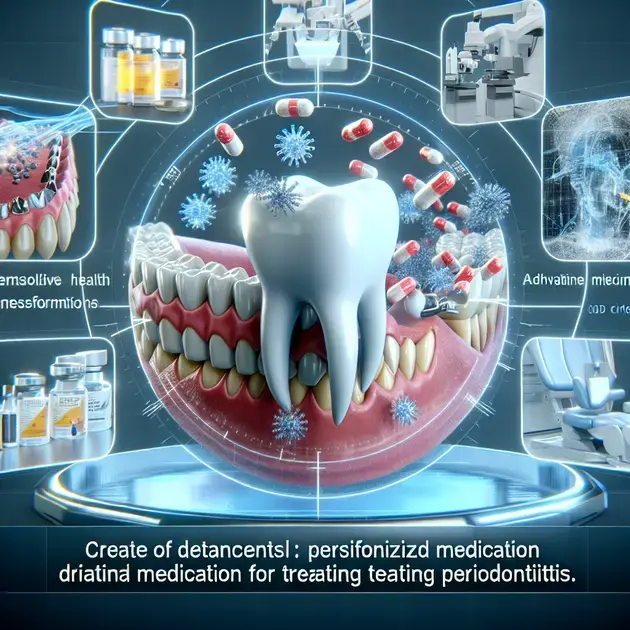When it comes to treating periodontitis, finding the best medication is crucial for managing this serious gum infection. In this comprehensive guide, we will explore various treatment options to help you make an informed decision about the most effective medications available.
Periodontitis is a common and potentially severe condition that affects the gums and bone supporting the teeth. Choosing the right medication can not only alleviate the symptoms but also prevent further complications, such as tooth loss. Let’s dive into the details of the best medications for periodontitis to improve your oral health.

Choosing the Right Medication for Periodontitis
Choosing the right medication for periodontitis is crucial for effectively managing the condition. When selecting a medication, it is essential to consult with a healthcare professional, such as a dentist or periodontist, to determine the most appropriate treatment plan for your specific case. One common medication prescribed for periodontitis is an antimicrobial mouthwash, such as chlorhexidine. This type of mouthwash can help reduce bacteria and inflammation in the gums, promoting healing.
Another medication option for periodontitis is an antibiotic, such as doxycycline. Antibiotics may be prescribed in pill form or as a gel that can be applied directly to the gums. These medications work to eliminate harmful bacteria and prevent further infection in the affected areas. It is important to follow the prescribed dosage and instructions carefully to ensure the medication is effective.
In addition to antimicrobial mouthwashes and antibiotics, over-the-counter pain relievers may also be recommended to help manage discomfort and inflammation associated with periodontitis. Common pain relievers such as ibuprofen can help reduce pain and swelling, allowing for improved oral hygiene practices and better overall oral health.
When choosing the right medication for periodontitis, it is important to consider any allergies or sensitivities you may have to certain medications. Be sure to inform your healthcare provider of any allergies or medical conditions you have before starting any new medication regimen. By working closely with your healthcare team, you can determine the best medication options for your individual needs and improve the health of your gums.
Understanding Periodontitis Medication Options
Understanding the various medication options available for treating periodontitis is key to effectively managing the condition. Some common medication options for periodontitis include antibiotics, antimicrobial mouthwashes, and pain relievers. Antibiotics such as amoxicillin and metronidazole are commonly prescribed to help combat the bacterial infection causing periodontitis.
Antimicrobial mouthwashes containing ingredients such as chlorhexidine or essential oils can help reduce bacteria in the mouth and prevent further infection. These mouthwashes are typically used as a complement to regular brushing and flossing to improve oral hygiene and reduce inflammation in the gums.
In some cases, a dentist or periodontist may recommend the use of a prescription-strength mouthwash or gel to target specific areas of infection in the gums. These medications are designed to penetrate deep into the gum tissue and eliminate bacteria that may be resistant to over-the-counter treatments.
Pain relievers such as acetaminophen or ibuprofen may also be recommended to help manage discomfort and swelling associated with periodontitis. These medications can provide relief while undergoing treatment for the condition, allowing for improved oral hygiene practices and better overall oral health.
By understanding the medication options available for treating periodontitis, you can work with your healthcare provider to develop a comprehensive treatment plan that addresses your individual needs and promotes the health of your gums.
Tips for Managing Periodontitis With Medication
Managing periodontitis with medication requires a multifaceted approach that includes proper medication use, good oral hygiene practices, and regular dental visits. To effectively manage periodontitis with medication, it is important to follow the prescribed treatment plan provided by your healthcare provider. This may include taking antibiotics as directed, using antimicrobial mouthwashes regularly, and incorporating pain relievers as needed.
In addition to medication, maintaining good oral hygiene practices is essential for managing periodontitis. This includes brushing your teeth at least twice a day, flossing daily, and using an antimicrobial mouthwash as recommended. Proper oral hygiene can help reduce bacteria in the mouth, prevent plaque buildup, and promote gum health.
Regular dental visits are also crucial for managing periodontitis with medication. Your dentist or periodontist can monitor your progress, provide professional cleanings, and make any necessary adjustments to your treatment plan. Routine check-ups can help ensure that your medication is working effectively and that your oral health is improving.
In addition to medication and oral hygiene, making lifestyle changes such as quitting smoking and eating a balanced diet can also help improve the effectiveness of treatment for periodontitis. Smoking can hinder healing and increase the risk of complications, while a healthy diet rich in vitamins and minerals can support gum health and overall well-being.
By incorporating these tips for managing periodontitis with medication into your daily routine, you can work towards improving the health of your gums and preventing further progression of the condition.

The Impact of Medication on Periodontitis Progression
Periodontitis is a serious gum infection that can lead to tooth loss and other oral health complications if left untreated. Medications play a crucial role in managing and controlling the progression of periodontitis. Antibiotics, for example, can help reduce the levels of harmful bacteria in the mouth that contribute to the development of gum disease. By targeting the underlying cause of periodontitis, medications can slow down the progression of the disease and prevent further damage to the gums and supporting structures of the teeth.
One of the key benefits of using medication to treat periodontitis is its ability to reach areas of the mouth that are difficult to access with traditional dental procedures. Topical antibiotics, in the form of gels or mouth rinses, can be applied directly to the affected areas, ensuring maximum effectiveness in combating the infection. In conjunction with professional dental cleanings and good oral hygiene practices, medication can significantly improve the outcome of periodontal treatment and help patients maintain healthy gums in the long term.
It is important to note that medication alone is not sufficient to manage periodontitis effectively. A comprehensive treatment plan that includes regular dental check-ups, professional cleanings, and lifestyle modifications is essential for controlling the progression of the disease. By working closely with your dentist or periodontist, you can develop a personalized medication regimen that is tailored to your specific needs and helps you achieve optimal oral health.
In conclusion, the impact of medication on periodontitis progression is significant, offering patients a valuable tool in managing and treating this common oral health condition. By incorporating medication into a comprehensive treatment plan, individuals with periodontitis can improve the health of their gums, reduce the risk of tooth loss, and enhance their overall quality of life.
Benefits of Personalized Medication for Gum Disease
Personalized medication for gum disease, also known as tailored medication, refers to the customized treatment approach that takes into account the individual needs and characteristics of each patient. Unlike one-size-fits-all medications, personalized medication offers specific benefits that can enhance the effectiveness of gum disease treatment and improve patient outcomes.
One of the primary advantages of personalized medication for gum disease is its ability to target the underlying causes of the condition in each individual. By analyzing factors such as the patient’s oral health history, genetic predispositions, and response to previous treatments, dentists can prescribe medications that are tailored to address the specific issues contributing to gum disease development.
Another important benefit of personalized medication is its potential to minimize side effects and adverse reactions. By selecting medications that are compatible with the patient’s overall health and well-being, dentists can reduce the risk of complications and ensure a more comfortable treatment experience. This personalized approach also allows for adjustments to be made to the medication regimen as needed, based on the patient’s response to treatment and ongoing oral health needs.
Furthermore, personalized medication for gum disease can improve treatment adherence and compliance among patients. By tailoring the medication regimen to fit the individual’s lifestyle, preferences, and treatment goals, dentists can empower patients to take an active role in managing their oral health and achieving positive outcomes. This personalized approach fosters a stronger patient-provider relationship and promotes a collaborative effort in combating gum disease effectively.
In summary, the benefits of personalized medication for gum disease are substantial, offering patients a targeted and holistic approach to treatment that maximizes effectiveness and minimizes risks. By embracing personalized medication as part of their gum disease management plan, patients can experience improved oral health, reduced symptoms, and enhanced overall well-being.
Maximizing Periodontitis Treatment with Tailored Medication
Tailored medication for periodontitis treatment represents a cutting-edge approach to addressing the specific needs and challenges of individuals with this advanced form of gum disease. By customizing medication regimens to target the unique characteristics of each patient’s condition, dentists can optimize the effectiveness of treatment and improve clinical outcomes in managing periodontitis.
One of the key ways in which tailored medication maximizes periodontitis treatment is by addressing the diverse factors that contribute to the progression of the disease. From controlling inflammation and reducing bacterial levels to promoting tissue regeneration and supporting periodontal healing, personalized medication can target multiple aspects of periodontitis to deliver comprehensive and long-lasting results.
Additionally, tailored medication allows for a more precise and targeted approach to managing periodontitis-related symptoms and complications. By selecting medications that are tailored to the patient’s specific needs and response to treatment, dentists can adjust the dosage, frequency, and duration of medication use to achieve optimal results while minimizing potential side effects and risks.
Furthermore, personalized medication for periodontitis treatment empowers patients to take control of their oral health and actively participate in their treatment journey. By collaborating with their dentists to develop a customized medication plan that aligns with their individual needs and preferences, patients can enhance their motivation, adherence, and satisfaction with the treatment process, ultimately leading to better outcomes and improved quality of life.
In conclusion, maximizing periodontitis treatment with tailored medication offers a promising approach to addressing the complex and multifaceted nature of this severe gum disease. By embracing personalized medication as a key component of the treatment strategy, patients with periodontitis can benefit from targeted, effective, and patient-centered care that promotes optimal oral health and overall well-being.
Conclusion
Medications play a crucial role in managing and controlling the progression of periodontitis, a severe gum infection that can lead to tooth loss and other oral health complications if left untreated. By targeting the underlying cause of periodontitis, medications like antibiotics can reduce harmful bacteria levels in the mouth, slowing down the disease’s advancement and preventing further damage to the gums and teeth.
Personalized medication, tailored to individual needs, offers specific benefits for treating gum disease by addressing underlying causes effectively. Dentists can analyze factors such as oral health history and genetic predispositions to prescribe medications that target the specific issues contributing to gum disease development. This tailored approach minimizes side effects, enhances treatment adherence, and fosters a collaborative patient-provider relationship, ultimately improving oral health outcomes.
In conclusion, incorporating medication into a comprehensive treatment plan for periodontitis and gum disease can significantly enhance patient outcomes. By embracing personalized medication and maximizing its effectiveness through tailored regimens, individuals with these oral health conditions can experience improved oral health, reduced symptoms, and an overall enhanced quality of life, ultimately promoting optimal oral health and well-being.



